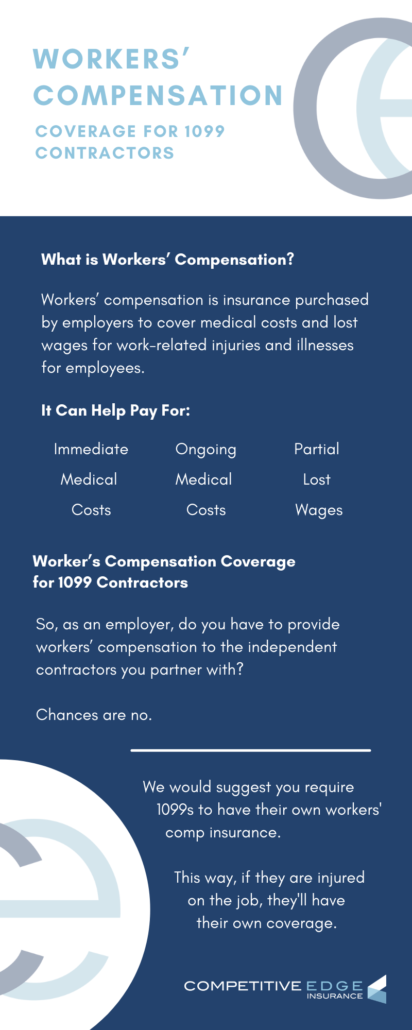Workers’ Compensation Coverage for Independent Contractors
As an employer, you’re likely familiar with workers’ compensation coverage being purchased to protect your employees. When you decide to work with an independent contractor or 1099 worker, however, the question arises of whether or not your current coverage limits will include coverage for your 1099s as well.
Let’s take a look at workers’ compensation coverage for independent contractors.
What is Workers’ Compensation?
Workers’ compensation coverage is insurance, purchased by employers, to cover medical costs and lost wages for work-related injuries and illnesses for employees. It is required by law in California and lack of proper coverage can result in fines and even criminal exposure.
Worker’s compensation coverage can help pay for:
- Immediate medical costs (i.e. emergency room expenses)
- Ongoing medical costs (i.e. physical therapy)
- Partial lost wages while the employee is unable to work
Who Needs It?
Laws and requirements regarding workers’ compensation vary on a state-by-state basis. The policy, however, is required in almost every state for businesses with employees.
In California, for example, “all California employers must provide workers’ compensation benefits to their employees under California Labor Code Section 3700,” according to the Department of Industrial Relations.

Who Qualifies as an Independent Contractor?
1099 workers are self-employed independent contractors.
An independent contractor is, in simple terms, “is a self-employed person or entity contracted to perform work for—or provide services to—another entity as a nonemployee,” according to got1099. An independent contractor is also sometimes referred to as a freelancer, a gig worker or an outsourced service provider.
Unlike traditional employees, independent contractors do not work regularly for an employer but work as required.
A key part of being classified as an independent contractor, according to the IRS, is that the person who hires an independent contractor can only “control or direct… the result of the work and not what will be done and how it will be done.”
Assembly Bill 5 (AB-5)
Assembly Bill 5, also referred to as AB-5, or the Gig Work Bill, is a federal law that passed in January 2020. AB-5 introduced further regulations for independent contractor classification.
Under AB-5, the ABC test is used to set the standard for worker classification. All workers are considered W-2 employees unless they meet all three of the following criteria:
- “The worker is free from the control and direction of the hiring entity in connection with the performance of the work, both under the contract for the performance of the work and in fact;
- The worker performs work that is outside the usual course of the hiring entity’s business; and
- The worker is customarily engaged in an independently established trade occupation or business of the same nature that is involved in the work performed.”
Long story short, employers cannot hold control over independent contractors. The worker has the freedom to work when they choose, and how they choose within the parameters of their contractual agreement.
Worker’s Compensation Coverage for 1099 Contractors
So, as an employer, do you have to provide workers’ compensation to the independent contractors you partner with? Chances are no.
According to Gusto, you don’t typically have to cover independent contractors under your workers’ compensation policy. “That’s because they’re not technically considered employees of your business. The line separating independent contractors from employees isn’t always clear, though.”
We’d recommend speaking with trusted financial personnel, like an accountant, to determine if the person is a 1099 contractor or a W-2 employee.
Whether or not you have to provide workers’ compensation for independent contractors, however, also depends on where you conduct your business. Remember, each state has its own laws when it comes to workers’ compensation. Be sure to do your research.
Require 1099s to Have Their Own Insurance
In the likely case that you are not required to provide workers’ compensation insurance for the independent contractors that you hire, we would strongly suggest that you require any 1099 workers to prove that they have their own workers’ compensation insurance.
This way, if they are injured on the job, they’ll have their own coverage and will not trigger a claim on your policy and cost you money.
Working with 1099s Who Don’t Have Their Own Insurance
On the other hand, if an independent contractor doesn’t have their own workers’ compensation insurance, you must account for this financially as an employer.
Logically, if you hire a 1099 worker who doesn’t have their own workers’ comp insurance, your own insurance carrier may charge you higher rates in order to account for the coverage of these additional workers.
If your 1099 has not provided proof of Workers’ Compensation coverage and they were to get injured while working for you, your insurance carrier would look at the role tehy perform and assess additional coverage charges based on the fee structures for that category of work. This can result in a heft upcharge. So, be sure to check with your 1099s to ensure they have their own coverage (not only Worker’s Compensation but General Liability as well).
As always, be sure to ask independent contractors for a Certificate of Insurance (COI) when hiring 1099s. Read on to learn more about the importance of COIs.



